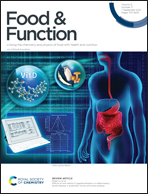Melanoidins, extracted from Chinese traditional vinegar powder, inhibit alcohol-induced inflammation and oxidative stress in macrophages via activation of SIRT1 and SIRT3
Abstract
Alcohol induces inflammation and oxidative stress with the dysregulation of proinflammatory cytokines, which are implicated in the pathogenesis of alcoholic liver injury. Melanoidins are known to exert an antioxidant effect, however, their function in inhibiting alcohol-induced inflammation is unclear. In this study, we examined the role of melanoidins from Chinese traditional vinegar powder in terms of their anti-inflammatory and antioxidant properties in RAW 264.7 macrophages and elucidated their mechanisms of function. In macrophages, melanoidins significantly suppress the mRNA expression of interleukin (Il)-6, Il-1β and tumor necrosis factor α (Tnf-α) with a concomitant inhibitory effect on IL-1β, IL-6 and TNFα secretion, which are increased by ethanol. In addition, ethanol significantly increases the cellular reactive oxygen species (ROS) levels and the expression of cytochrome β-245 and beta polypeptide (Cybb), which are repressed by melanoidins to basal level. However, the expression of genes related to oxidative stress significantly decreases in response to ethanol, while it is significantly increased by melanoidins. Importantly, treatment with ethanol led to significant decreases in SIRT1 and SIRT3 transcription, translation, and activation, as well as the nicotinamide adenine dinucleotide (NAD+) levels. Interestingly, all the decreases were markedly attenuated by melanoidins. Ethanol promoted the expression of proinflammatory genes, whereas coincubation with resveratrol (a potent SIRT agonist) inhibited this effect. Conversely, the addition of sirtinol (a known SIRT inhibitor) augmented the proinflammatory gene expression. Taken together, our findings suggest that melanoidins exert anti-inflammatory and antioxidant functions via abolishing decreases in SIRT1 and SIRT3 expression and cellular NAD+ levels in ethanol-induced macrophages and may serve as a new therapeutic agent for the prevention of alcohol-induced cell damage.



 Please wait while we load your content...
Please wait while we load your content...